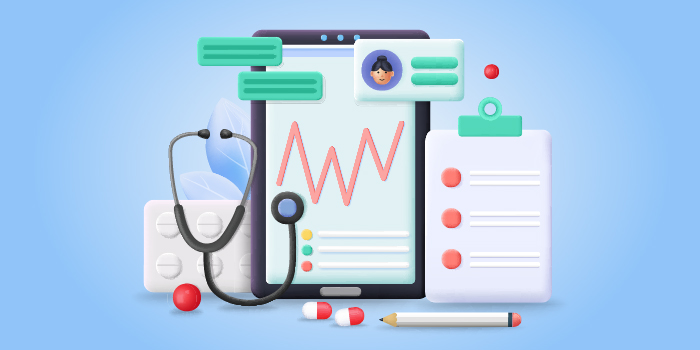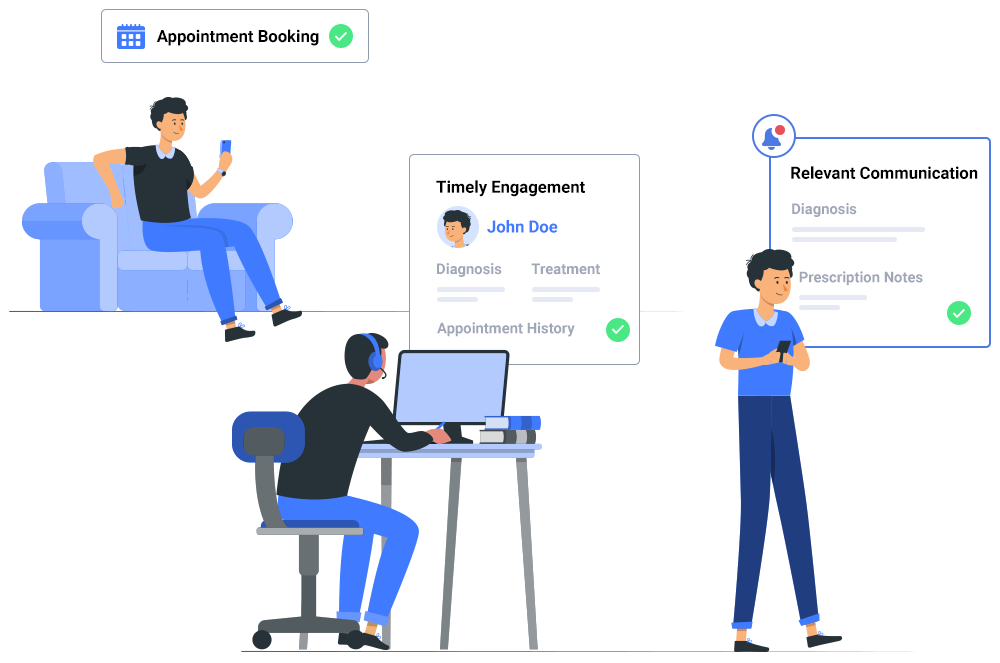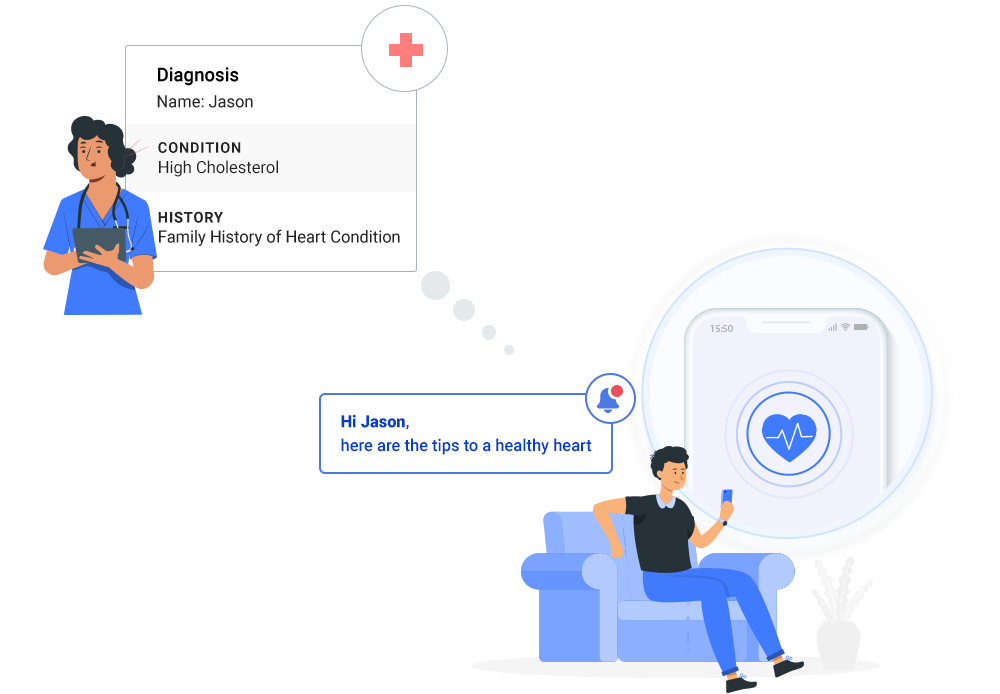 hospital management system" width="575" height="324" />
hospital management system" width="575" height="324" /> hospital management system" width="575" height="324" />
hospital management system" width="575" height="324" />
Ever wondered what it is like to manage an entire hospital?
It definitely sounds difficult.
Well, if you’ve landed on this article, you know that efficiently running an entire hospital isn’t a walk in the park. Although it is essential, it gets overwhelming at times.
Time is of the utmost importance when it comes to healthcare. Imagine the severity if there is even a minor delay or fault while sharing the results and diagnosis. To simplify operations and efficiently manage patient records, leading hospitals use a hospital management system. Employing hospital management software helps you reap the maximum benefits from your work.
Before discussing in detail how you can leverage an HMS to the fullest, let us understand what an HMS is and why it is needed.
A study showed that healthcare providers spend 35% of their time on documenting patient data. While paperwork is unavoidable in a hospital, you can automate the process and reduce the burden on the staff and doctors. Not just this, hundreds of other processes run parallel in a hospital. An HMS is a one-stop solution to manage all hospital processes and data transfer. You can use it to digitize and simplify activities like:
Overall, an HMS helps you improve patient experience and the quality of service provided in the hospital. At the same time it is also used to minimize operating expenses and improve the revenue cycle.
In a nutshell, Hospital Management System (HMS) creates a frictionless approach to managing the entire hospital and solving operational complexities.
However, HMS can be a complex system. For ease of understanding and implementation, it is divided into different modules. These modules are built depending on the needs of a department or a particular process. Let’s look at the 11 HMS modules that are essential for any hospital to improve end-to-end productivity.
Below we have discussed the 11 hospital management system modules in the same order that a hospital would need them, according to a patient’s journey.
 hospital management system modules" width="1200" height="4845" />
hospital management system modules" width="1200" height="4845" />
Managing appointments manually is not only tedious but also increases the chances of human errors. Even patients are inclined to choose a hospital with an option to book appointments online. In a recent study, 68% of patients said they would prefer to schedule, modify, or cancel appointments online.
This hospital management system module enables you to add a scheduling option to your hospital’s website so that patients can easily schedule an appointment.

Once your patient has booked an appointment, the HMS software for hospitals will match the patient’s illness to the doctor’s area of expertise. It will then assign them to the next available specialist or the one they prefer. It also updates the available slots in real-time to avoid any confusion at the hospital.
The next step in appointment booking is to collect medical documents. An HMS with a patient portal is used to collect documents and share the patient history with the doctors well in advance. If the patient requires assistance at his/her house, the system will check the doctors’ availability for the remote visit and allocate accordingly. In this way, you can create a smooth and error-free process by digitizing the appointment booking process.

After the patient onboarding is completed, the patient is moved to an IPD or OPD. The patient management module of HMS caters to the needs of the inpatient and outpatient departments. It captures and stores the medical history, treatment required, details of their previous visits, upcoming appointments, reports, insurance details, and more.
Patient management software also generates unique admissions numbers for each patient to easily manage admissions, discharges, and transfers. It also builds a comprehensive discharge summary to ensure smooth discharge. At the same time, it records and generates related documents, e.g., consent forms for electronic signature.
When you start collecting and storing details on hospital software systems, by default you also eliminate the need to get these details on every visit. HMS enables doctors and staff to focus more on treatment than administrative work.
Now, if you wish to automate other activities like patient communication, consider integrating your HMS with marketing automation software such as LeadSquared. It will enable you to automate communication with patients and doctors. You can send appointments and lab test reminders, or follow-ups, and build meaningful long-lasting relationships.
 hospital management system" width="1000" height="694" />
hospital management system" width="1000" height="694" />
To provide a smooth experience for your patients, it is essential for your staff to have easy access to necessary hospital records. The facility management module of a healthcare management system helps you to maintain records of bed availability, occupancy status of rooms with specialized care, and more.
Healthcare management systems collect all such information and make it readily available to your receptionist.
If you have multiple facilities, then an HMS connects them to provide an overall picture. For example, doctors can access patient data from any hospital using an online hospital management system. Patients can visit any hospital according to their convenience, as all the records are available online.
The staff management module provides a concrete solution for the HR department. It contains records of your staff, job description, service domain, and other vital details.
It helps you to know your staff without going through a heavy bundle of files. Additionally, it enables you to plan the hiring process based on the requirements of the hospital.
A hospital cannot afford to be short of medical supplies. Not having the medicine at the right time or a minor delay in refill can lead to severe results. The supply management component of the HMS tracks the availability of medical stocks. It helps you calibrate the minimum quantity of supplies required without any hassle. It records the purchase date, quantity consumed, and supplier details. This way, you can calculate or predict the next purchase and reorder before the stock falls short. It also provides the details of the medicine available so that doctors can prescribe the ones in stock.
The financial management component of an HMS deals with the financial affairs of your hospital. It calculates, stores, and presents the billing information to the patients.
Additionally, it also records the expenses incurred by the hospital, revenue data, and other financial details of the hospital.
This consolidation saves you the trouble of analyzing a colossal pile of record books.
An HMS’ insurance management component records and stores patients’ insurance details. On requirement, it presents the policy number, insurance company, and other associated information.
The hospital management software makes it easy to fetch these details, making insurance validation easier.
The laboratory management feature of hospital management software shows the details of various lab tests patients take. It furnishes reports when needed and maintains all records collectively. The doctors can easily access it. It also notifies the doctor and the patients when the results are ready.
Report Management module, records and stores all the reports generated by the hospital.
In the case of financial reports, it analyzes performance metrics to check the business profitability. It also provides a comparison between performance reports for different years. An authorized person can access these hospital management system reports whenever required.
Furthermore, you can use healthcare dashboards to present these reports in an easy-to-read format.
A vaccination model of hospital management software keeps track of all the completed or upcoming vaccinations. It updates you about upcoming vaccinations and books a slot with the doctor. It also sends timely reminders to parents to ensure they don’t miss the slot.
Patient satisfaction is of utmost importance for any hospital. This segment records data like inquiries, complaints, requests, and feedback from patients. It also ensures that you handle these requests and problems appropriately and at the soonest. You can automate the feedback collection process to reduce the staff’s workload, and everyone could fill out the feedback form.

If you are still thinking of whether or not to implement an HSM. To answer this let’s discuss the benefits you will observe after implementing an HMS.
59% of millennials are willing to switch doctors for better online access. An HMS will improve communication between patients and hospitals by allowing patients to access their medical records, book appointments, receive reminders, and communicate online with their doctors and nurses. You will have improved patient engagement, a reduction in waiting times, and increased patient satisfaction.
Hospital management software must help you keep hospital data safe and secure. You can limit the access to authorized personnel only. Make sure to look for HIPAA Compliant software for PHI security.
You can have easy entry to all patient-related data on a system using an HMS. You can also access data such as patient history, doctors engaged, test results, billing information, and many more with just a few clicks.
Streamline your hospital workflows by automating routine tasks like appointment or inventory management. This reduces the time and effort required to perform these tasks and the turnaround time. It also allows hospital staff to focus on more critical patient care areas.
Implementing hospital management software can lead to significant cost savings for hospitals. It helps by reducing administrative overheads, improving resource allocation, and minimizing the wastage of medical supplies. An HMS can also optimize revenue streams by ensuring timely billing and reducing claim denials.
An HMS can provide valuable insights regarding operations by generating real-time reports on various metrics, such as patient flow, occupancy rates, and revenue generation. This enables you to make data-driven decisions, improve processes, and optimize resources.
An HMS helps build a centralized platform for managing operations, allowing hospitals to streamline their administrative processes. It ensures consistency across departments. This can improve efficiency, reduce errors, and better overall patient care.
An HMS can help reduce medical errors by providing doctors and nurses with up-to-date patient information. It minimizes the risk of misdiagnosis, incorrect treatment, or adverse drug interactions.
An HMS can also reduce readmissions and rehospitalization rates by ensuring timely follow-ups. This improves patient outcomes and reduces the risk of complications.
To get to know how effective a Hospital Management System can be for hospitals, let us have a look at the example of how Manipal Hospital benefited from it.
Manipal Hospitals is one of India’s largest healthcare providers, with over 27 multispecialty hospitals. They have multiple teams working together to enable a smooth patient experience.
With a high patient volume and each team working on a different platform, keeping track of each patient’s journey and managing appointments became increasingly hard for Manipal Hospitals. They needed to centralize leads across India while securely managing patient information. LeadSquared provided an all-in-one solution integrated with their existing HIS.
| Sales and marketing Goals | Leadsquared Solutions | Results |
| Improve connectivity between teams and departments | One platform to manage all the processes and store data | Improved team collaboration |
| Improve reporting | Customizable and detailed reporting | Built data-driven strategies |
| Increase team efficiency | Automate processes for higher productivity | Improved patient management |
LeadSquared’s APIs and connectors help us collect detailed patient data and integrate it with our core HIS system. The dashboards and reports enable us to work with this data and derive great insights from it. Both these features help streamline processes, save time, and in turn boost team productivity.
Kiran Ramakrishna, Assistant Manager, Manipal Hospitals
Hospital Management System (HMS) is essential to the delivery of modern healthcare. It can boost patient outcomes, lower medical errors, and improve the overall quality of care. It enables hospitals with a centralized platform to manage their operations, automate mundane processes, and enhance communication.
Moreover, Healthcare CRM, when integrated with the Hospital Management System, helps you combine professional medical care with quality patient service.
To experience the benefits of an integrated HMS and Healthcare CRM system, get in touch with our team today!
There are generally two types of HMS, cloud-based and on-premises. A cloud-based or web-based hospital management software is hosted on the provider’s server. In contrast, on-premises hospital management software is hosted on the hospital’s private server and data centers.
A cloud-based hospital management system is more popular as it is cost-effective, and the provider can handle it remotely.
While implementing an HMS, you may face the following challenges:
1. Cybersecurity
2. Lack of technical team support
3. Complex interface
4. Higher initial implementation cost
To overcome these challenges, you need the right provider. They will ensure data security and support the implementation and staff training.
An off-the-shelf CRM is popular as it is cost-effective and quick to implement. It is a great option for small to medium sized organizations looking for basic and essential features. Whereas a custom-built HMS provides more control over the usage and features.